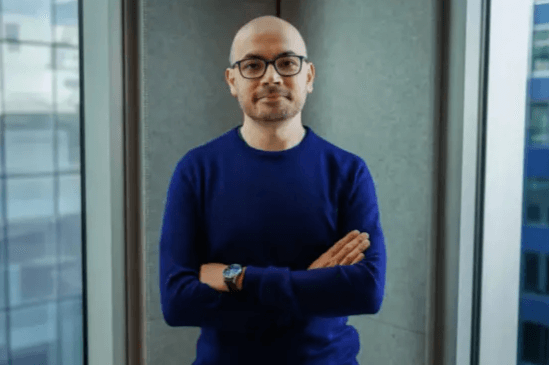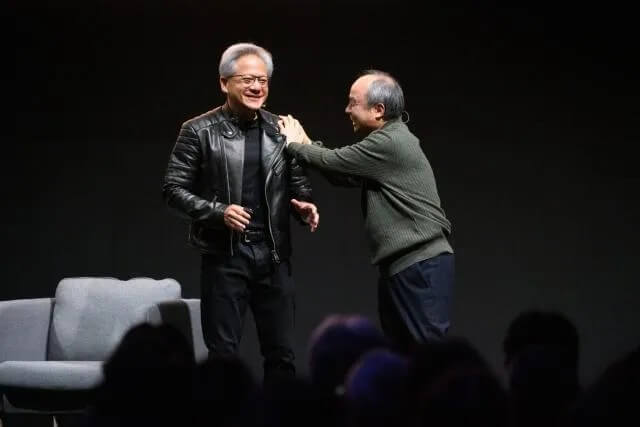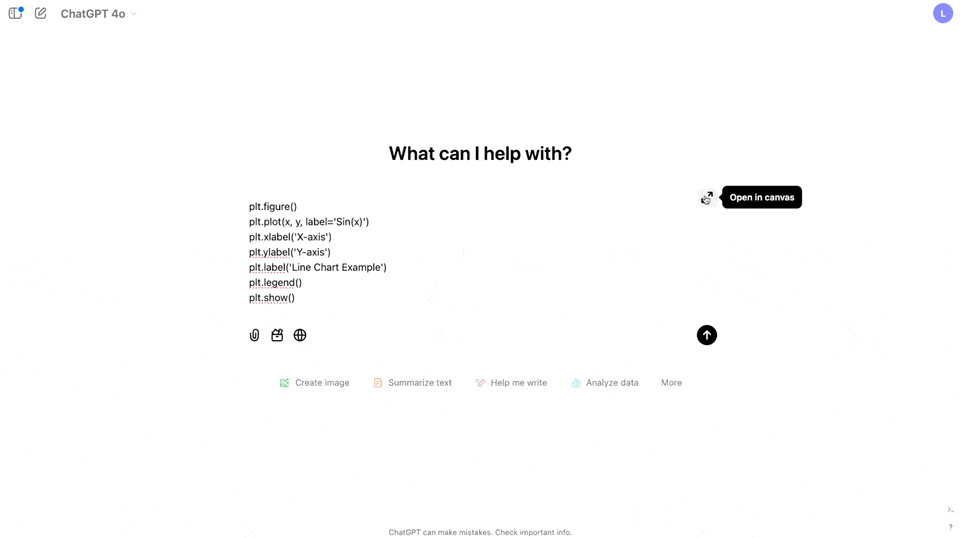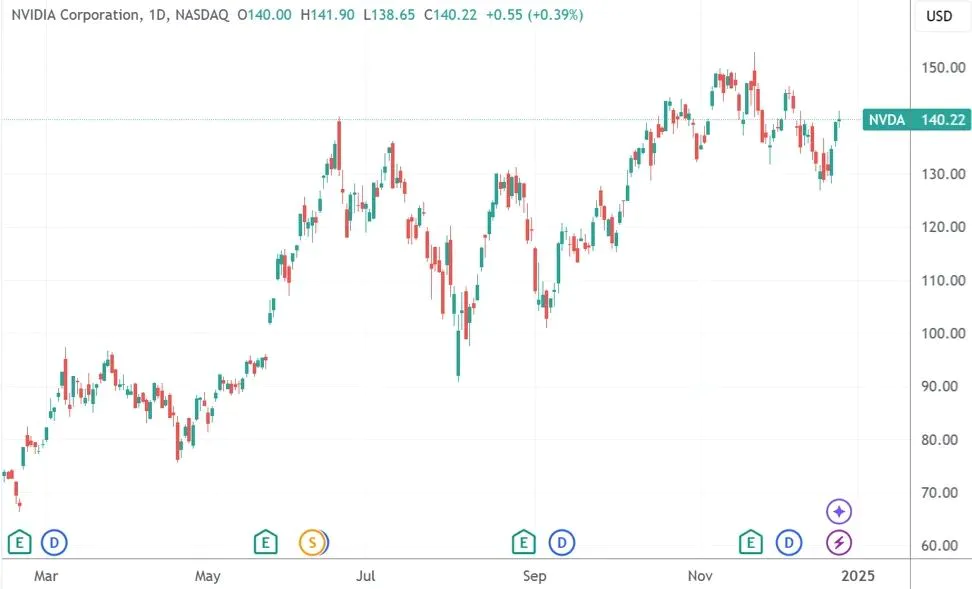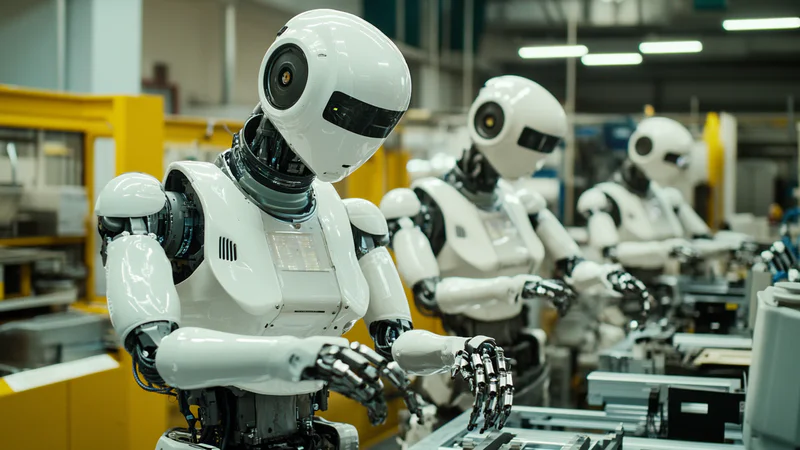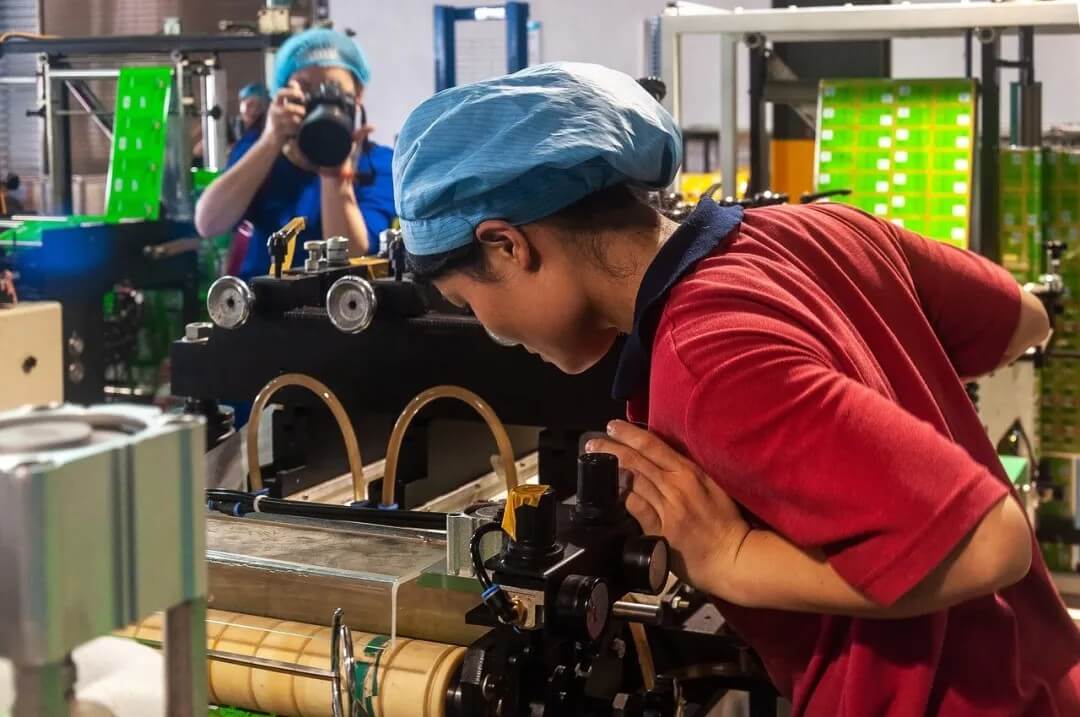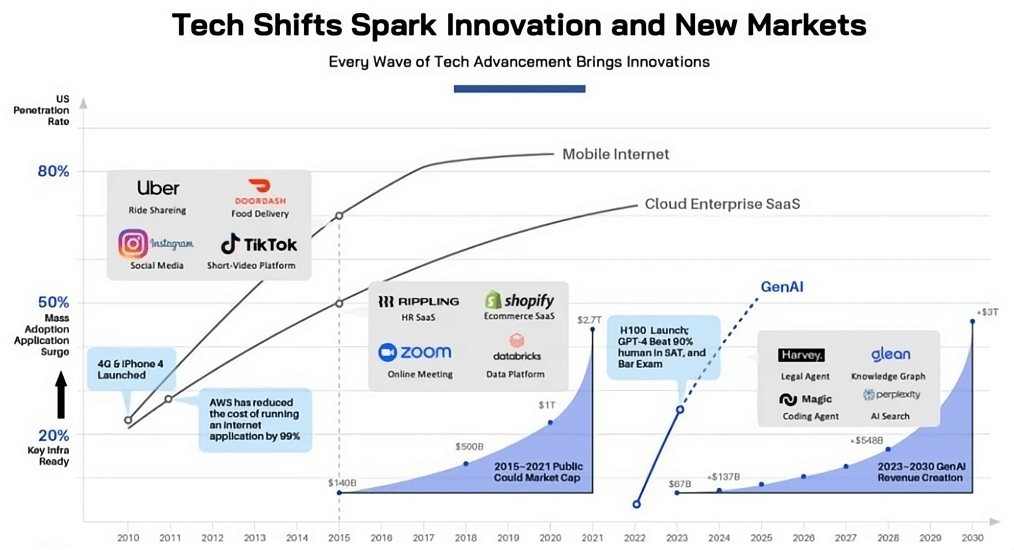ChatGPT marks its second anniversary, revolutionizing AI and tech. With OpenAI's valuation soaring by $8 trillion, Musk’s lawsuit to block its profit shift, and plans to reach 1 billion users, the AI landscape is evolving rapidly. Explore the challenges and future of AI.
Two Years Have Passed...
Since the launch of ChatGPT, it has brought revolutionary changes to the world. OpenAI's official Twitter account shared a post from two years ago, asking "So, have you tried it yet?" In the comment section, users eagerly asked OpenAI for a "gift," with some wondering if the full version of GPT-1 would be released today, after using it for two years. Sam Altman, however, responded by saying, "We made a treehouse," offering no hints about an upcoming new model. Greg Brockman, co-founder of OpenAI, was one of the first to send his congratulations to ChatGPT.
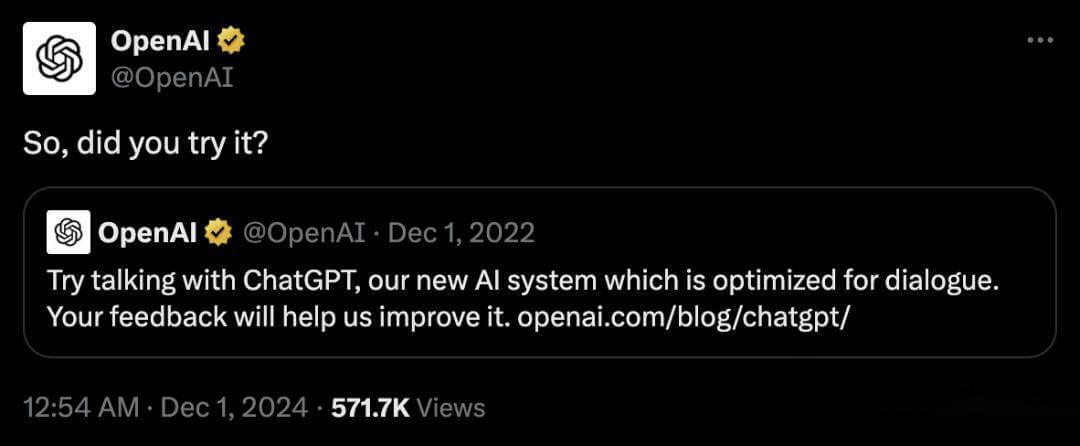
Since then, AI has become a high-frequency term mentioned across the internet. As of now, ChatGPT boasts 250 million active users weekly.
Moreover, since the release of ChatGPT, the market capitalization of the world's six largest tech companies has grown by more than $8 trillion. Among them, Nvidia's market value has seen the most significant surge.
After completing a new $6 billion round of funding, OpenAI's latest valuation has reached $150 billion, and it is actively seeking another round of financing to support annual expenses of $5 billion.
All this funding is being used to train the next generation of models and build infrastructure.
According to recent reports, OpenAI is set to launch its AI agents in 2025, with a target to expand to a billion users in the future.
The World’s Tech Giants: $8 Trillion Valuation Surge
The release of ChatGPT marked a turning point for the world's tech companies.
Recent statistics from Bloomberg show that major tech giants such as Nvidia, Google, Microsoft, Apple, and Amazon have shared in the $8 trillion valuation boom brought on by AI.
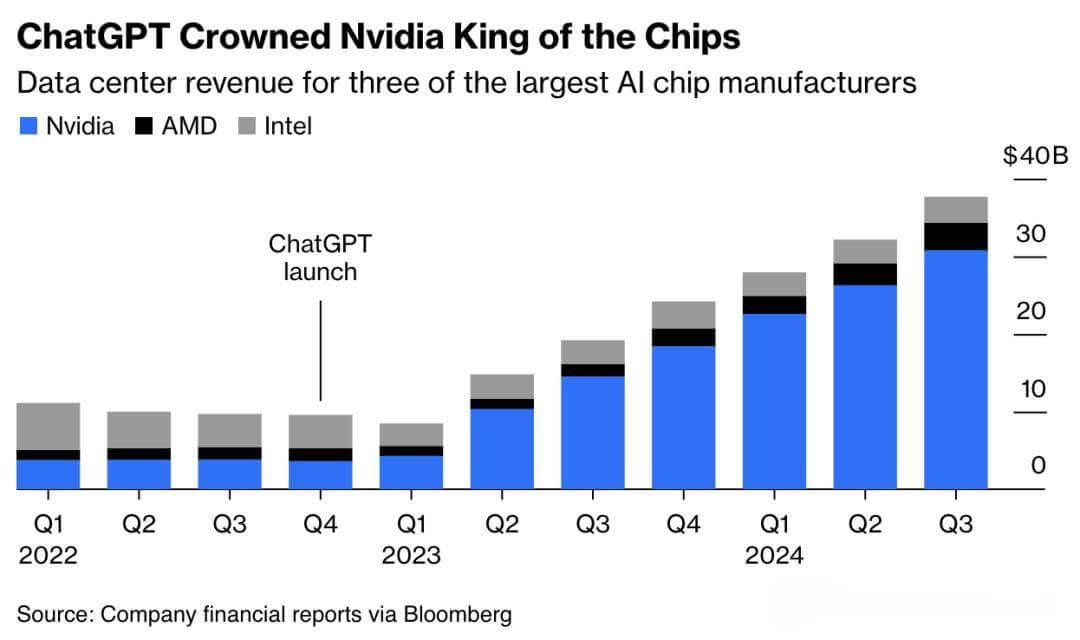
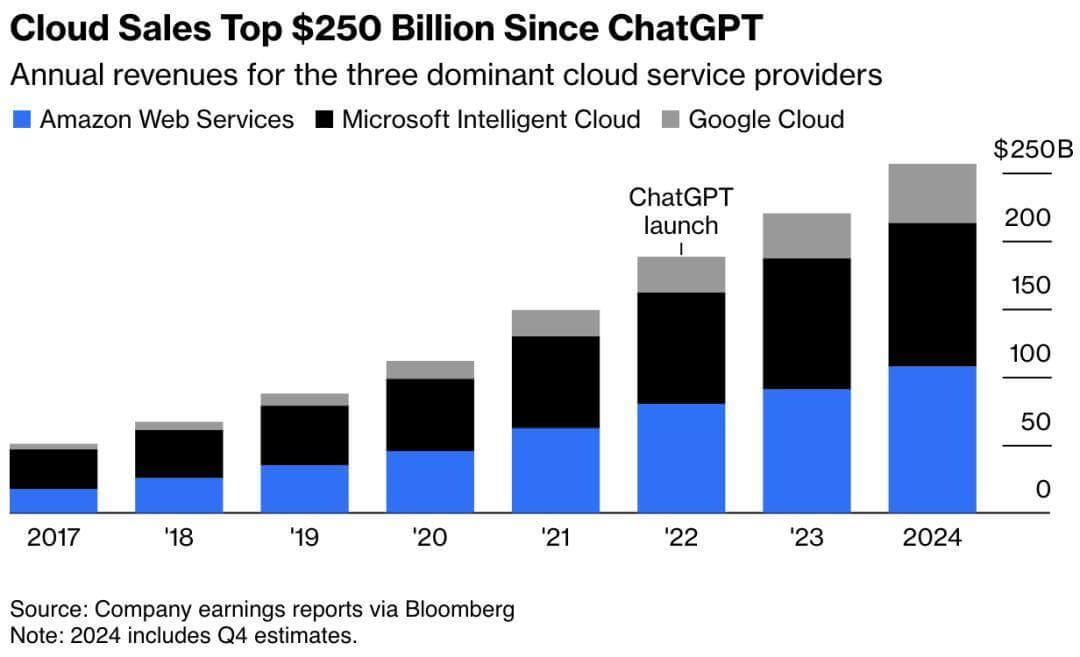
A simple chart shows the market value changes of six companies since the launch of ChatGPT in 2022. The entire technology sector's S&P 500 index rose by 30%.
Meanwhile, Nvidia has greatly surpassed AMD and Intel, solidifying its position as the global leader in computing power.
Additionally, the three major cloud service providers—Microsoft, Amazon, and Google—have seen accelerated growth in cloud revenue, crossing the $250 billion mark.
However, smaller companies have seen relatively less return.
On ChatGPT’s Birthday, Musk Stirs Trouble
On ChatGPT’s birthday, Elon Musk made a significant move against OpenAI.
He submitted a new injunction to the court in an attempt to block OpenAI from becoming a fully profit-driven entity.
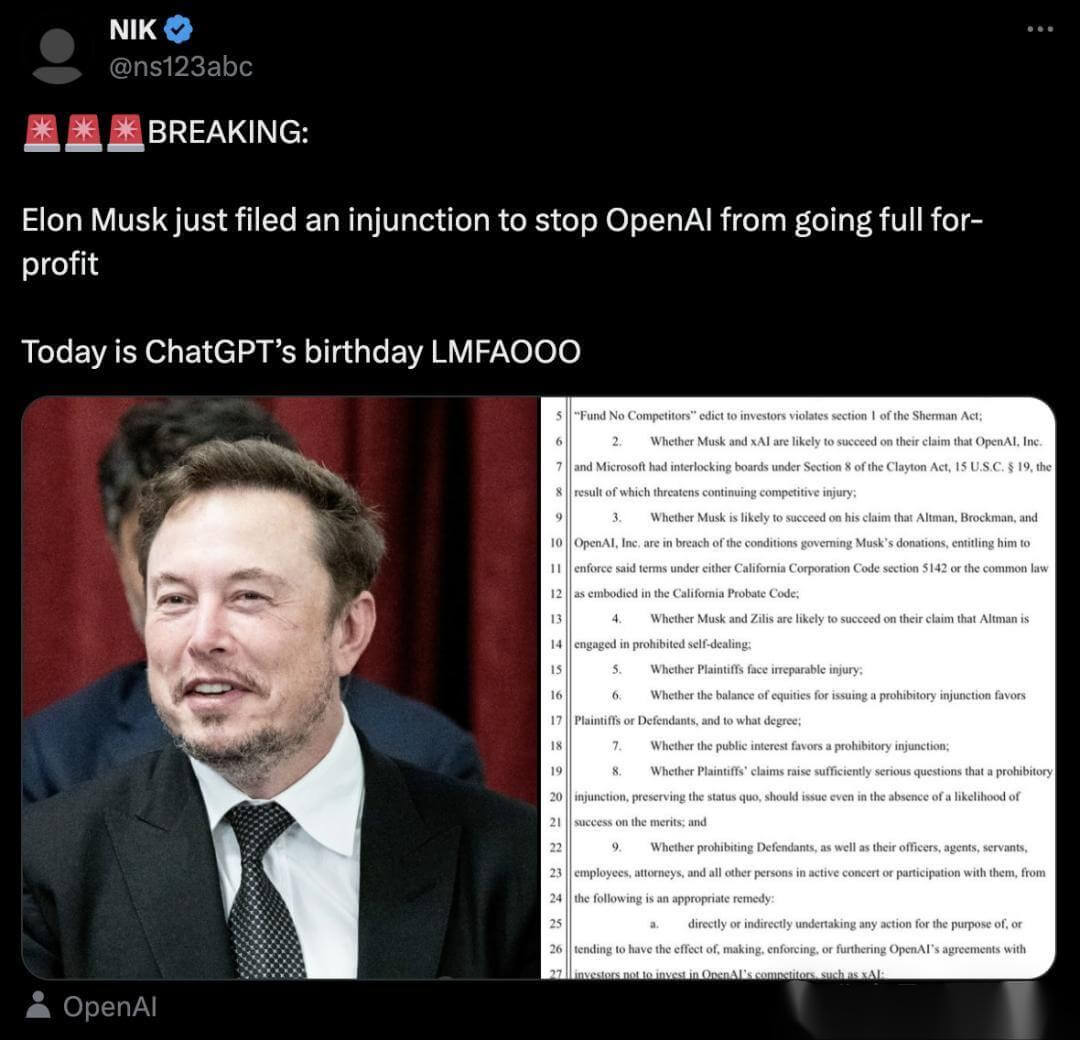
Musk’s legal team has filed a motion with the Northern District of California, accusing OpenAI, its CEO Sam Altman, President Greg Brockman, as well as Microsoft and LinkedIn co-founder Reid Hoffman, and former OpenAI board member and Microsoft Vice President Dee Templeton of engaging in various illegal and unfair competitive practices.
In summary, the accusations are fourfold:
-
Blocking Investor Support for Competitors: OpenAI allegedly uses its market position to prevent investors from supporting other competitors, like Musk's own xAI, thus limiting fair market competition.
-
Improperly Gaining Competitive Information: OpenAI is accused of improperly acquiring sensitive competitive information through its ties with Microsoft, giving it an unfair market advantage.
-
Transforming OpenAI’s Governance to a For-Profit Structure: The company allegedly changed its governance structure to a for-profit model, transferring valuable assets, including intellectual property, to other entities.
-
Conducting Business with Conflicted Financial Interests: OpenAI’s dealings with other accused parties are alleged to harm market fairness due to significant financial interests in the companies involved.
If the court does not approve the injunction, Musk’s legal team claims it will cause "irreparable harm" to the market. They argue that preventing OpenAI's transition to a for-profit model will make it "nearly impossible" to reverse the company’s transactions, thus avoiding "massive investment losses."
Even if Musk wins, OpenAI may not have "enough funds" to pay damages, as its expenses exceed $5 billion, and it is far from reaching a financial balance.
"In order to protect OpenAI’s remaining non-profit nature and prevent self-dealing, issuing the injunction is the only appropriate remedy. If not, by the time the case is heard, the OpenAI Musk and the public were promised will no longer exist."
This is not the first time Musk has sued OpenAI. In July, Musk withdrew a lawsuit accusing OpenAI of violating its original non-profit mission and not ensuring that its research benefited everyone.
Musk claimed he was duped into donating $44 million to OpenAI, which, although categorized as a donation, was allegedly driven by concerns about the existential risks posed by AI.
In the amended lawsuit in November, Musk added Microsoft, Hoffman, and Templeton as defendants, while also adding Neuralink executive and former OpenAI board member Shivon Zilis and xAI as plaintiffs.
Last year, Musk founded xAI, which soon released a top-tier generative AI model, Grok, to support several features on his social network product, X (formerly Twitter). It also offers an API for clients to integrate Grok into third-party applications, platforms, and services.
However, xAI’s ability to raise investment is constrained by OpenAI.
Musk’s legal team claims that OpenAI requires investors to commit not to fund xAI or its competitors, with at least one major investor from OpenAI’s October funding round reportedly refusing to invest in xAI.
However, this claim seems unsubstantiated, as xAI’s fundraising has gone smoothly, completing a $5 billion round this month, with notable investors such as Andreessen Horowitz and Fidelity participating. It now has about $11 billion in funding, making it one of the best-funded AI companies globally.
Musk’s preliminary injunction motion also alleges that Microsoft and OpenAI continue to illegally share proprietary information and resources, and that several defendants, including Altman, are engaged in self-dealing, harming market competition.
The filing mentions that OpenAI chose Stripe as its payment platform, a platform that Altman has a significant financial interest in, and rumors suggest Altman made billions from his Stripe shares.
Since Microsoft’s first investment in OpenAI in early 2019, the two companies have strengthened their collaboration, with Microsoft investing around $13 billion in exchange for nearly 49% of the company's revenue share. Microsoft also provides OpenAI with significant cloud resources to train, fine-tune, and run large AI models.
In March of this year, OpenAI’s spokesperson responded by stating, "Musk’s fourth attempt is just another repetition of the same, exaggerated, baseless complaints."
OpenAI’s AI Agents Coming in 2025, Targeting 1 Billion Users
In addition to ChatGPT, OpenAI is betting on a series of new AI products, building its own data centers, and forging strategic partnerships with Apple.
They have set their next phase of growth, aiming to reach 1 billion users within the next year.
Although ChatGPT currently has a "mere" 250 million weekly active users, starting last month, it has been deployed on billions of Apple devices, making the target of 1 billion users seem like a small goal.
Apple has over 2 billion iPhones globally and is also reportedly planning to launch a new AI-powered smartphone.
If OpenAI integrates closely with ChatGPT and hits the 1 billion user mark, it will cement its place among the world’s strongest tech companies, alongside giants like Google and Facebook.
Another growth opportunity lies in the development of "agents," which is expected to be a key focus in AI this year. OpenAI plans to launch its AI agents, which will help users perform tasks like "web information gathering" and "ordering or purchasing items."
However, next year will be even more competitive, as companies like Google, Anthropic, and Microsoft are also planning to release their own intelligent assistants.
While OpenAI is growing rapidly and its future looks bright, there are still potential risks, including leadership changes and rising costs.
Challenges Facing OpenAI
OpenAI has lost key executives from its research and safety teams, including three of its original co-founders and prominent tech leaders like Ilya Sutskever and Mira Murati.
At the same time, OpenAI is actively transitioning from a non-profit model to a for-profit business model. Its workforce has grown fivefold to over 2,000 employees, balancing long-term research goals with a focus on generating revenue to cover its escalating costs.
OpenAI’s annual expenses exceed $5 billion, and it is far from achieving financial balance.
However, in October, CFO Sarah Friar raised over $6 billion in funding, achieving a $150 billion valuation, the highest ever for a startup in Silicon Valley, and plans to continue raising "more funds."
OpenAI will also need to address complex political issues, aligning with the U.S. government’s AI priorities and resolving disputes with Musk.
Predictions for GPT-1’s Release
Over a month ago, Altman asked, "What should we give ChatGPT for its second birthday?"
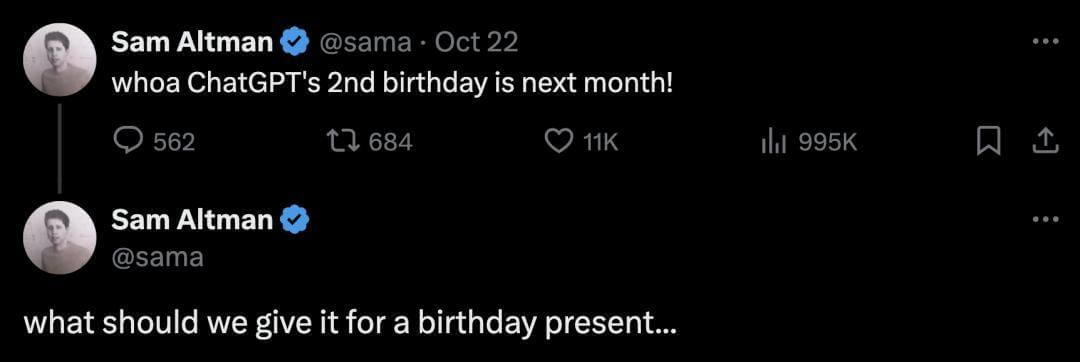
Even the official ChatGPT account was teasing the release of GPT-1’s full version.
Some insiders have speculated that OpenAI may release updates related to voice or advanced modes tonight.
There are also rumors that the full version of GPT-1 could be unveiled.
Abacus AI’s founder noted that since ChatGPT launched and sparked a surge in AI development, the number of frontier AI models has grown from a few to dozens, and the use cases for text, code, video, and image generation have progressed from prototypes to actual applications.
However, "we are just getting started! The next two years will be even more intense than the last. As AI becomes more autonomous and independent, it will become even more magical."
References:

